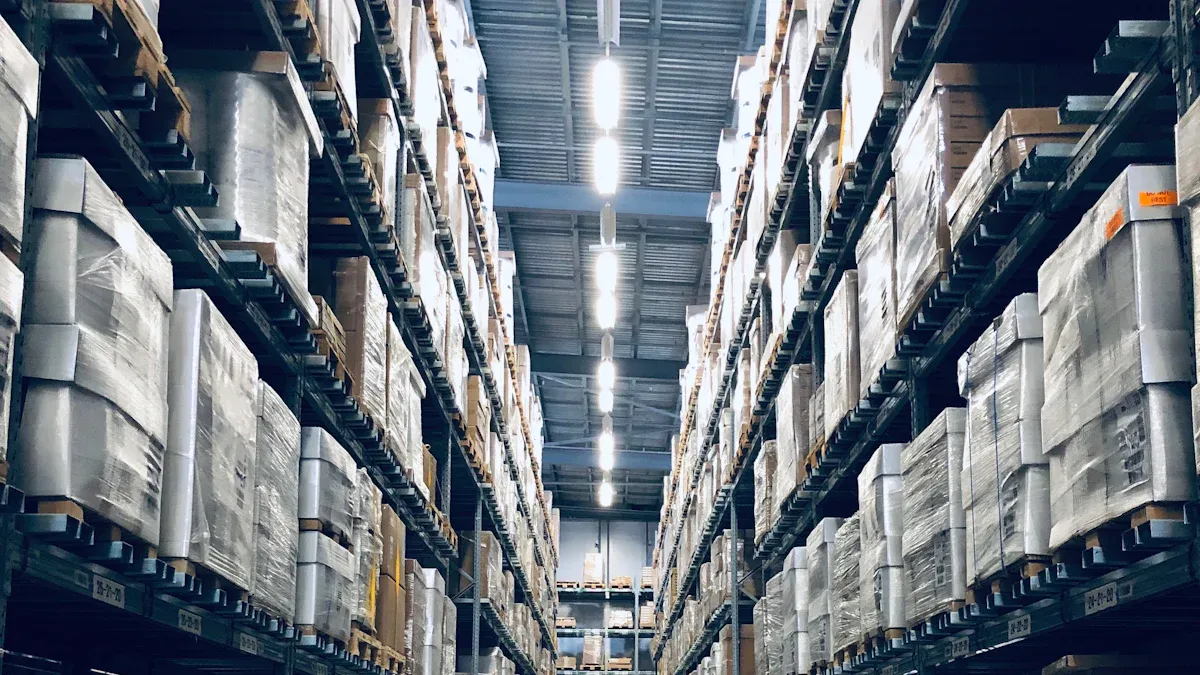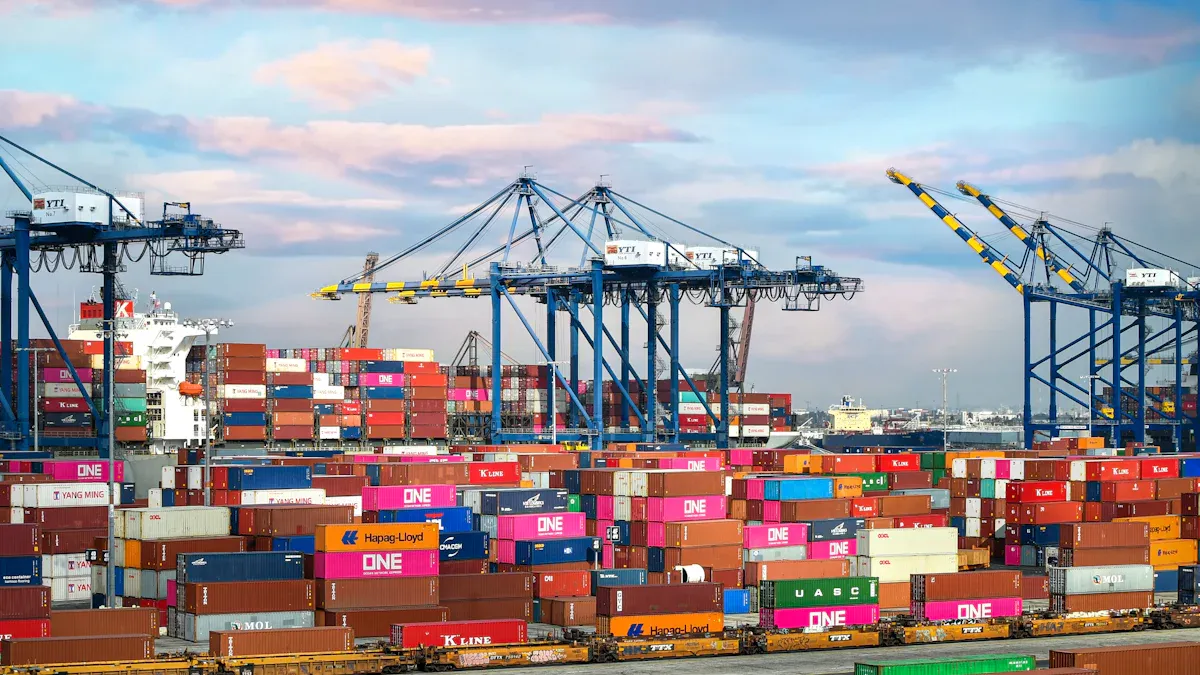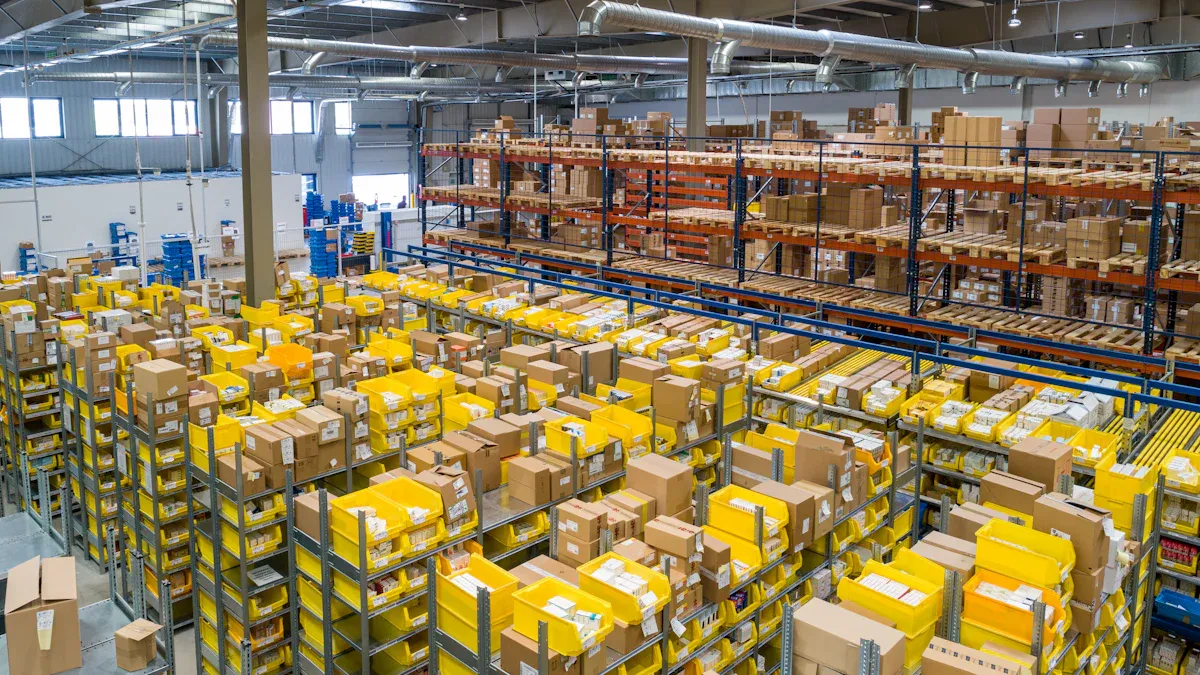What Is a Logistics Company and How Does It Work

You depend on logistics companies to plan, move, and store goods. These companies help you keep your supply chain running smoothly and support your business every day.
Over 40% of global businesses now rely on logistics partners to manage supply chains and improve delivery speed.
The most common services include:
Service Type | Description |
|---|---|
Transportation | Critical for timely delivery of goods, accounting for 29.5% of revenue in 2023. |
Warehousing and Distribution | Expected to grow at a CAGR of 7.8%, driven by e-commerce and the need for efficient solutions. |
Supply Chain Management | Includes services like contract logistics and customs brokerage, offered by major companies. |
Third-Party Logistics | Provides comprehensive logistics solutions, enhancing operational efficiency for businesses. |
Ocean and Air Freight | Essential for international trade, supporting the surge in global logistics demands. |
You can see what is a logistics company and how it works by looking at these services and how they help your business grow.
Key Takeaways
Logistics companies are essential for planning, moving, and storing goods, helping businesses run smoothly and efficiently.
Using logistics services can lead to significant cost savings by optimizing shipping routes and consolidating carriers.
Technology plays a crucial role in logistics, improving tracking, inventory management, and overall efficiency in supply chains.
Strong partnerships with logistics providers enhance reliability, adaptability, and customer satisfaction in shipping processes.
Implementing eco-friendly practices in logistics can reduce carbon emissions and promote sustainability in business operations.
What Is a Logistics Company and How It Works

Definition
You may wonder what is a logistics company and how it works. A logistics company plans, implements, and controls the movement and storage of goods. You rely on these companies to make sure products reach the right place at the right time. The IFS Logistics standard sets the rules for quality and safety in logistics operations. This standard covers activities such as transport, storage, and distribution. You benefit from transparency and traceability because logistics companies follow these standards.
When you look at the core functions, you see several important activities:
Demand planning helps you fulfill customer orders by managing merchandise and transport.
Storage and materials involve keeping goods safe and ready in warehouses.
Inventory management controls the flow of goods based on what customers need.
Transportation management moves products through the supply chain using different methods.
Control means managing information to keep logistics operations running smoothly.
You can see what is a logistics company and how it works by looking at these functions. Each part helps you deliver products efficiently and safely.
Role in Supply Chain
You play a key role in the supply chain when you work with a logistics company. These companies streamline operations and boost your business efficiency. You get help with inventory management, storage solutions, and shipping. Logistics experts track inventory levels to prevent stockouts and overstocks. They offer tailored storage options to make your process more efficient. You also benefit from managed outbound logistics and better shipping rates.
Tip: Logistics companies use automation and AI to improve accuracy and speed in supply chain operations. You get real-time insights that help you manage inventory and forecast demand.
Recent case studies show how logistics companies make a difference:
A global automated material handling company used predictive analytics and AI to improve inbound logistics and inventory management. This led to streamlined operations and lower costs.
A direct-selling company improved its reverse logistics process, which reduced costs and increased client satisfaction.
An outdoor power tool brand turned its returns process into a profitable operation by using efficient reverse logistics.
Coca-Cola İçecek automated scenario generation, which helped make faster decisions and improved supply chain performance in several countries.
Danone-Waters in Mexico increased production capacity by 13% and cut costs by 5% through digital optimization.
You see what is a logistics company and how it works when you look at these examples. Logistics companies help you cut unnecessary costs and raise productivity by optimizing resources. You can use just-in-time inventory practices to reduce holding costs and keep inventory at the right level. Efficient logistics operations ensure your products arrive on time and accurately, which improves customer experience. E-commerce businesses depend on strong logistics to meet customer expectations for fast delivery, building trust and loyalty.
You also benefit from eco-friendly practices. Logistics companies optimize transportation routes to reduce fuel use and carbon emissions. Many companies now use energy-efficient transportation and focus on waste reduction.
When you ask what is a logistics company and how it works, you see that these companies use technology, planning, and expertise to make your supply chain stronger and more efficient.
Core Services

Transportation
You rely on logistics companies to move goods across the globe. They use several transportation modes to meet your needs:
Ocean transport offers low costs and handles high volumes, making it vital for international shipments. About 80% of global freight moves by sea.
Road transport gives you flexibility and accessibility, especially for short and medium distances. It is essential for last-mile delivery.
Air transport provides speed for urgent shipments, though it costs more.
Rail transport is reliable for bulk goods but has limited reach.
Logistics companies help you cut transportation costs by setting clear goals, auditing expenses, and automating processes. You benefit when they consolidate shipments, negotiate better rates, and optimize packaging. Technology lets you track shipments in real time and improve efficiency.
Tip: Strong partnerships with carriers and suppliers can lower your shipping costs and boost reliability.
Warehousing
Warehousing is a key service that keeps your goods safe and ready for delivery. Modern logistics companies offer advanced solutions:
Feature | Description |
|---|---|
Speeds up handling and reduces damage risk. | |
Climate Control Capabilities | Protects temperature-sensitive products and ensures quality. |
Scalability and Flexibility | Adapts to your changing storage needs and new technologies. |
Cutting-Edge Technology | Uses WMS and IoT for real-time tracking and better efficiency. |
Sustainability Initiatives | Reduces environmental impact with eco-friendly practices. |
Safety and Security Measures | Guards goods and staff with advanced security systems. |
Efficient Layout and Design | Improves workflow with smart warehouse design. |
Value-Added Services | Offers packaging and order fulfillment for customer satisfaction. |
Skilled Workforce and Training | Ensures proper handling through employee training. |
Warehouse Management Systems (WMS) help you track inventory and streamline operations. Automated systems and IoT devices boost accuracy and reduce labor costs.
Inventory Management
You need accurate inventory management to avoid stockouts and overstocks. Logistics companies use systems like Perpetual Inventory, Just-in-Time (JIT), and Materials Requirement Planning (MRP). These tools keep your stock levels right and cut waste. Cross-docking methods move items quickly, reducing storage time and costs. You get faster deliveries and lower risks of damage.
Freight Forwarding
Freight forwarding helps you ship goods internationally. You gain safety and security for your shipments, even if they are fragile. Freight forwarders know trade rules and help you handle customs and paperwork. You save money and get faster deliveries. They manage risks from delays, lost goods, and changing regulations.
Note: Freight forwarding simplifies global trade by coordinating transportation, warehousing, and compliance.
Technology
Technology drives efficiency in logistics. You use platforms like Warehouse Management Systems (WMS), Transportation Management Systems (TMS), and GPS tracking. Artificial Intelligence and cloud computing help you analyze data and optimize routes. Digital tracking systems give you visibility over shipments, let you monitor deliveries, and help you avoid delays. These tools cut labor and fuel costs, improve safety, and make your supply chain stronger.
You see what is a logistics company and how it works when you look at these core services. Each part supports your business and helps you deliver products quickly and safely.
Operations
Coordination
You need strong coordination to keep your supply chain running smoothly. Logistics companies use several strategies to manage complex supply chains.
You benefit from strong relationships with partners, which help solve problems quickly.
Technology and automation tools make your supply chain more visible and efficient.
Strategic sourcing gives you access to new markets and better operations.
You also rely on seamless communication. Real-time messaging lets you respond fast to changes. Network-based communication connects every part of your supply chain. Advanced data encryption keeps your information safe. Automation of routine tasks helps your workflow move without delays.
Logistics companies use different systems to support coordination:
Warehouse Management Systems (WMS) track inventory and manage logistics.
Routing systems direct inventory from one place to another.
Order-confirmation systems keep you updated on your orders.
Paging and voice communication systems share important information with employees.
Text messaging systems allow quick exchanges.
Process Optimization
You want your logistics operations to be as efficient as possible. Logistics companies use several techniques to optimize processes:
Transportation Management Systems (TMS) automate planning and save costs.
Route optimization finds the best delivery paths and reduces fuel use.
Advanced analytics help you spot problems and keep inventory at the right level.
Automated warehouse operations make tasks faster and more accurate.
Real-time tracking and collaboration tools improve shipment monitoring.
Electric vehicles and green logistics lower costs and help the environment.
Artificial intelligence and machine learning optimize routes and automate tasks.
You measure success by setting and reviewing key performance indicators (KPIs). Data analytics help you find inefficiencies and predict future trends. Operational metrics show faster process times and better resource use. Financial metrics reveal lower costs and higher revenue per employee.
Tracking
You need real-time tracking to know where your shipments are. Logistics companies use advanced technologies for this purpose:
Technology | Description |
|---|---|
5G | Enables fast and reliable communication for real-time tracking. |
IoT Devices | Track conditions and inventory levels with connected devices. |
GPS | Provides accurate location and route monitoring for shipments. |
Augmented Reality (AR) | Overlays digital information on physical assets for better awareness. |
AI-powered Predictive Analytics | Predicts risks and disruptions by analyzing past data. |
Real-time tracking gives you visibility and transparency. You get accurate delivery estimates, which reduce uncertainty. Customers feel informed and engaged, leading to higher satisfaction and loyalty. Timely notifications and alerts keep everyone updated and build trust in your logistics process.
Logistics vs. 3PLs & Brokers
Differences
You may wonder how logistics companies, third-party logistics providers (3PLs), and freight brokers differ. Each plays a unique role in moving goods and managing supply chains. The table below helps you see these differences clearly:
Type | Description |
|---|---|
Acts as a middleman between shippers and carriers. Focuses on individual shipments. | |
Third-Party Logistics | Offers a wide range of services beyond shipping. Includes supply chain management and technology integration. |
Manages the entire logistics process. May include 3PLs and freight brokers in its network. |
You get different service levels from each provider. Freight brokers help you find carriers for single shipments. 3PLs give you more options, such as warehousing, inventory management, and technology solutions. Logistics companies often handle all logistics tasks, including those offered by 3PLs and brokers.
The table below compares service offerings between logistics networks and 3PLs:
Aspect | Third-Party Logistics Providers | |
|---|---|---|
Ownership and Control | Owned and controlled by your company. | Operated by an external provider; limited control. |
Scope of Services | Customized to cover all logistics needs. | Standardized services with some customization. |
Scalability | Requires significant investment to grow. | Scalable solutions without large investments. |
Cost Structure | High upfront and ongoing costs. | Predictable costs with lower upfront investment. |
Technology Investment | Needs substantial investment in technology. | Uses advanced technologies already in place. |
You see that logistics companies give you full control but require more resources. 3PLs offer flexibility and technology without high costs. Freight brokers help you with quick shipping solutions.
Choosing the Right Service
You want to pick the best logistics partner for your business. You should look at several important criteria:
Description | |
|---|---|
Reliability | The partner should deliver on time and meet your expectations. |
Adaptability | The provider must adjust to your changing needs. |
Costs | Competitive pricing matters for your bottom line. |
Location | Nearby providers can reduce shipping times and costs. |
International Service Network | A strong global network helps if you ship worldwide. |
Pricing Structure | Clear pricing helps you plan and manage costs. |
Customer Service | Good communication and problem-solving are vital. |
Tracking and Delivery | Real-time tracking gives you transparency. |
Inventory Management | Accurate records keep your operations efficient. |
Insurance Coverage | Adequate insurance protects your shipments. |
You should also consider these points:
Customer satisfaction depends on responsive service.
Technology matters. Your provider should use systems that fit your needs.
Safety records show how well a provider handles regulations.
Adaptability lets your provider create custom plans for your business.
Tip: Avoid common mistakes when choosing a logistics partner. Bad communication, ignoring new technology, poor international shipping plans, and not understanding shipping services can hurt your business.
You make a smart choice when you match your needs with the right provider. Reliable logistics partners help you grow, save money, and keep customers happy.
Business Benefits
Cost Savings
You can save a lot of money by working with a logistics company. When you consolidate your carriers and optimize your fleet, you gain more negotiating power. One company saved $3.5 million each year by focusing on fewer carriers and improving how they used their trucks. You might notice that a small group of carriers often handles most of your transportation costs. By managing these relationships better, you can cut expenses even more.
Modern logistics companies also help you save by automating workflows and improving document management. SEW-EURODRIVE, a global leader, reported big savings in both time and money after making these changes. You can see similar results when you use advanced logistics solutions.
Tip: Review your carrier list and look for ways to consolidate. This can lead to major cost reductions.
Efficiency
You want your business to run smoothly. Logistics companies help you reach high levels of accuracy and speed. They use technology and best practices to boost your productivity. You can see the difference in key industry benchmarks:
Metric | Benchmark Value |
|---|---|
Order Accuracy Rate | 99.5%+ |
On-Time Shipments | 99.7%+ |
Productivity Improvement | 15-20% greater |
You benefit from fewer mistakes and faster deliveries. Your team spends less time fixing errors and more time serving customers. With better systems, you can handle more orders without adding extra staff.
Risk Reduction
You face many risks in your supply chain. Logistics companies use several strategies to protect your business assets. They help you avoid unreliable suppliers, transfer risks through insurance, and reduce hazards with regular maintenance. You also gain extra protection by adding buffers and making contingency plans.
Strategy Type | Description |
|---|---|
Risk Avoidance | Stay away from risky activities, like unreliable suppliers. |
Risk Transfer | Use insurance to cover possible losses, such as cyberattacks. |
Risk Reduction | Add controls, like regular checks and security upgrades. |
Risk Buffering | Build in extra time or resources to handle problems. |
Risk Strategizing | Create plans for threats and their effects. |
Risk Digitization | Use AI and analytics to spot and monitor risks. |
Risk Testing | Test scenarios to see how risks might affect you. |
Risk Quantification | Calculate the possible financial impact of risks. |
You also get real-time tracking with GPS and IoT sensors. These tools let you monitor shipments and keep goods safe from theft or damage. By using these risk reduction methods, you protect your business and keep your supply chain strong.
You see how logistics companies plan, move, and store goods to keep your business running smoothly. These partners help you save money and work faster. When you choose a logistics company that shares your values, you build trust and grow together.
Collaborations can lead to cost savings of 7–9% and profits up to three times higher.
Most shippers report better service and lower costs with strong partnerships.
You should review your supply chain needs and think about working with a trusted logistics partner for long-term success.
FAQ
What does a logistics company do?
You get help moving, storing, and tracking goods. Logistics companies plan shipments, manage warehouses, and use technology to keep your supply chain running smoothly.
How can a logistics company save you money?
You save money by using better shipping routes, combining shipments, and automating tasks. Logistics experts help you avoid mistakes and reduce waste.
What is the difference between a 3PL and a logistics company?
3PL Provider | Logistics Company |
|---|---|
Offers specific services | Manages full logistics process |
Uses advanced technology | Handles planning and control |
You choose based on your business needs.
How does technology improve logistics?
You use tools like GPS, warehouse systems, and AI to track shipments and manage inventory. Technology helps you deliver faster and avoid errors.
Can logistics companies help with international shipping?
Yes! You get support with customs, paperwork, and global regulations. Logistics companies make international shipping easier and safer for your business.
See Also
Understanding East Coast B2B Warehousing and Distribution Solutions
Essential Elements of Effective Global Logistics and Shipping Practices
Key Strategies for Effective Global Logistics Management Success
PGL's Miami Warehouse Solutions for Quick East Coast Shipping
Streamlined Inventory Management and Distribution with PGL Warehousing
